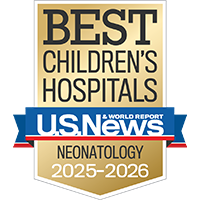Translation, please
We have interpreters for Cantonese, Mandarin, Spanish, Russian, American Sign Language and more.
Request an interpreter

Twin reversed arterial perfusion (TRAP) sequence — also called acardiac twinning — is a very rare problem, occurring in about 1 percent of monochorionic twins, or identical twins who share one placenta.
In TRAP sequence, one twin is usually structurally completely normal. The other is an abnormal mass of tissue, usually having legs and a lower body but no upper body, head or heart. Because of the absent heart, the term "acardiac twin" has been used to describe this mass. The normal fetus is referred to as the "pump twin" because its heart pumps blood to the abnormal mass. The acardiac twin has no chance of survival.
The normal "pump twin" faces the excess burden of having to send and receive blood to the acardiac mass as well as to its own growing tissues. As such, the normal twin's heart has to work extra hard and is under a lot of stress. This can result in heart failure. Left untreated, up to 50 percent of these otherwise normal twins may die in utero or shortly after birth. Fetal treatment is available when necessary.
To request an appointment, call the Fetal Treatment Center: (800) 793-3887
The risk of the "pump twin" going into heart failure and dying seems to depend on the size of the acardiac twin. The larger the acardiac twin compared to the pump twin, the greater the risk. The amount of blood flow into the acardiac twin also seems to play a role — the more blood flow, the higher the risk. In addition, the harder the pump twin's heart is working, the greater the risk of heart failure.
These factors can be checked with ultrasound tests. In critical cases, these tests must be repeated frequently.
Low-risk cases, where the acardiac twin is small and there is little stress on the pump twin's heart, may only require monitoring. With frequent ultrasounds, doctors can keep an eye on the normal twin's health and identify signs of heart failure. If heart failure is identified and the pregnancy is far enough along, then the normal pump twin is simply delivered.
Many efforts have been made over the years to treat TRAP sequence, focused on finding a way to safely stop blood flow to the acardiac mass, thereby protecting the normal pump twin from heart failure or death. The UCSF Fetal Treatment Center pioneered the most successful form of treatment, taking advantage of advanced technology called radiofrequency ablation (RFA) to stop blood flow into the acardiac mass.
The major benefit of the RFA technique compared to other techniques is the size of the instrument used. The RFA technique uses a small needle of about 1 millimeter in diameter, compared to 3 millimeters for instruments used in other procedures. The smaller device leads to fewer complications such as preterm labor and less trauma to the mother. The procedure is performed using real-time ultrasound guidance.
Having pioneered this technique, UCSF has the most experience with it. Our published results on RFA have shown a success rate greater than 90 percent in treating monochorionic/diamniotic TRAP sequence pregnancies, with an average age of 35 weeks gestation at delivery. This compares favorably with other techniques used to treat TRAP sequence, and has dramatically improved the outcome for pump twins in these pregnancies.
UCSF Benioff Children's Hospitals medical specialists have reviewed this information. It is for educational purposes only and is not intended to replace the advice of your child's doctor or other health care provider. We encourage you to discuss any questions or concerns you may have with your child's provider.

Top 10 in the nation for neonatology

Ranked among the nation's best in 11 specialties

successful open fetal surgery in the world

in number of fetal surgery clinical trials
Translation, please
